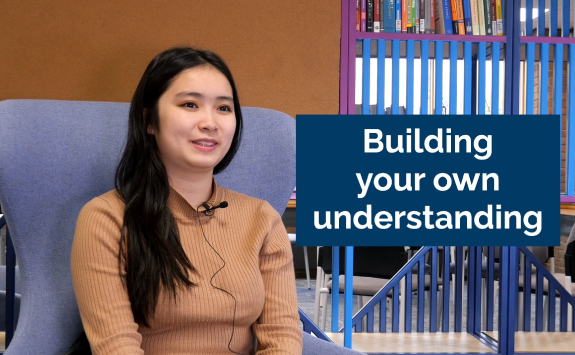Building your own understanding
Studying at Newcastle University gives you opportunities to take control of your own academic development. The University will of course support you, but it’s your degree, and the outcomes depend on you.
Students at Newcastle University are expected to actively engage with their learning. Your tutors will teach you, but you are the only person who can control your learning.
You will have regular lectures where you listen and make notes while your tutors talk about the topics you’re studying. However, lectures will not tell you everything you need to learn.
Instead, you should use your lectures as a starting point for studying more actively and independently. This means reading more widely in your own time, using the reading lists that your tutors will give you. At the higher stages of study, it may also mean choosing topics to research in more detail.
Your tutors will guide and support you, but you should also try to embrace opportunities to shape your own learning experiences.
Getting the best out of lectures
Developing your academic confidence
As well as lectures, you will also have regular seminars and tutorials. These are valuable opportunities to develop your understanding of topics by discussing them – not only with your tutors, but also with other students.
Seminars and tutorials are some of the most valuable experiences of studying at Newcastle University. They are based on the belief that we can often learn more about topics by discussing them with other scholars, rather than by just reading and thinking about them alone.
Sharing your opinions in seminars and tutorials can feel challenging for any student. Furthermore, it may feel particularly challenging if English is not your first language. Sometimes, it can feel easier and ‘safer’ to just observe the discussion, instead of joining in.
But your opinions matter, and your tutors want to hear what you think. You will learn much more by actively contributing to discussions, rather than just observing them. And your ideas may help other people in your group to see topics in a new way.
If English is not your first language, try not to worry too much about saying things ‘the right way’. Seminars and tutorials are not language tests, and tutors are not marking your grammar. The most important thing is sharing your ideas, not expressing them ‘perfectly’.
And the more regularly you contribute to discussions, the more natural it feels!
Getting ready to read
Studying at Newcastle University is about developing your understanding of a particular discipline, for example business, law or medicine. However, it is not only about that.
It’s also an opportunity to learn how to think more effectively about anything. And a lot of this is about building academic independence – the ability and confidence to make your own decisions about what you learn, and how you learn it. It’s your degree, and what you get out of it depends on what you put in.
Your tutors will support you in this. They do not expect students to feel entirely comfortable making their own study choices on day one of their programmes. Furthermore, they do not expect students to make the best decisions every single time.
If things do go wrong, try not to be too hard on yourself. Instead, use it as an opportunity to learn and develop so you can improve next time.

Accessing support when you need it
University can be difficult sometimes. Many students experience academic and personal challenges during their studies. Being far from home can make these challenges feel even more difficult.
But at Newcastle University you are never on your own. The University is here to support you, whatever academic or personal challenges you may experience. If you feel you need support, all you need to do is ask.
Asking for support can also feel challenging. However, it’s an important part of managing your own studies effectively, so nobody should ever feel embarrassed to say they need some help. See links below for further information about the range of support available to you.



.jpg)



